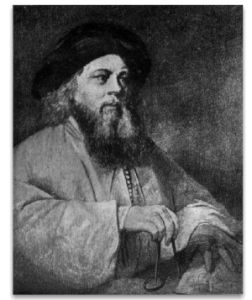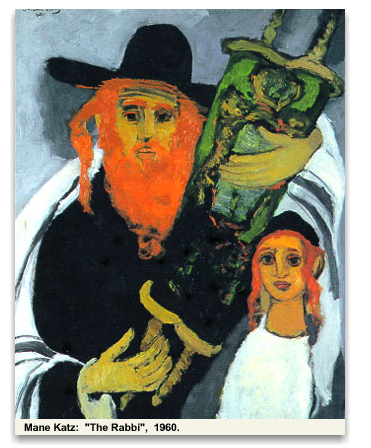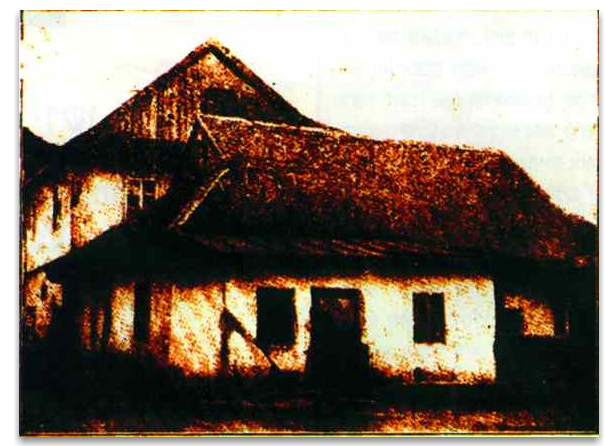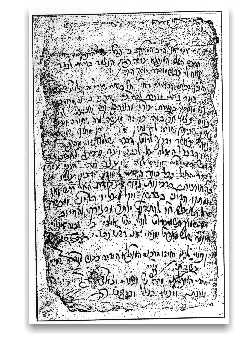
Israel Ben Eliezer, later known as The Baal Shem Tov (The Master of the Divine Name, var. Master of the Good Name), was born on August 27, 1698 to Rabbi Eliezer and his wife Sarah. They lived in the small village Okup on the Russian-Polish border. Both Rabbi Eliezer and Sarah were already very old when their first child, Israel was born.
Baal Shem means “Possessor or Master of The (Divine) Name”, which contemporaries and subsequent followers conferred upon him. Martin Buber (in Tales of the Hasidim) explained more kindly: ‘One who lives with and for this fellow-men on the foundation of his relationship with the Divine’.
Family and Background
In what is now the modern Ukraine, in the former region of Podolia, (the border of Poland and Russia) came the founder of the modern Hasidic movement. Folk tradition relates that to his exceptionally upright and pious parents in their advanced age it was announced in a vision that they would have a son, to be named Israel, who was destined to enlighten his people in Godliness. Shortly after his birth his mother passed away, and before long, his father followed. He was supported and raised by friends in the local village. At some point he subsequently embarked on his raison d’etre, immersing himself in building his spiritual life from within.
Life Sketch:
- circa 1700 – born in Okopy, Ukraine. Was a poor student, and preferred to meditate in the forests.
- Worked as a teacher’s assistant, leading the children to and from school. Inspired his charges with songs and stories. Became sexton of the synagogue. Spent his nights studying Kabbalah.
- circa 1718 – Married, but this (first) wife died soon afterwards.
- Moved to Brody, Galicia, where he presented himself to claim his new, promised wife. Presented himself as an unkempt illiterate person to his brother-in-law to be who was a Rabbi and an authority on the Kabbala. Produced a letter, and claimed his bride. His brother-in-law, embarrassed at Israel’s apparent ignorance, encouraged him to live elsewhere.
- He moved to a remote Carpathian village, supporting his family as a clay-digger and lime-digger. His expertise in medicinal herbs earned him a reputation as a (healer) ba’al shem. As he practiced his healing craft he also began to preach his religious teachings.
- circa 1736 – Hassidic legend speaks of the Besht publicly revealing his mission at the age of 36. This signifies Israel ben Eliezer’s widespread acceptance as a figure of religious authority.
In the last ten or fifteen years of his career, until his passing in 1760, while serving principally as a rabbi in Medziboz and its environs in the province of Podolia in Eastern Europe, he gathered around him and trained a group of dedicated disciples, and simultaneously inspired a wider circle of devotees, numbering perhaps several thousand. These, in turn, in later years, were multiplied into scores of thousands, thus affecting deeply the course of European Jewry for several hundred years. He spread his teachings effectively by means of simple stories and parables that appealed to the uneducated Jewish masses.
Master of the Divine Name
Hailing from the Kabbala – Hassidic tradition of European Jewry (sometimes called Hassidim or Chassidim), Baal Shem Tov is acclaimed “Master of the (Divine) Name”. Another common name for Baal Shem Tov is ‘Besht‘ being a shortening of the full title. He is generally identified as the founder of the Hassidic Movement.

The term Hasidim derives from the Hebrew hasid usually translated as ‘pious’ or ‘saintly’. The root of the word hasid is hesed, generally translated as kindness, or love. This love uniquely signifies the relationship between God and his people, in a most binding and irrevocable way. It is the foundation of the eternal covenant between God and his creation, “I will be YOUR God, YOU, shall be my people.”
The Shochet (ritual slaughterer)
Before his revelation as a Hassidic master, the Baal Shem Tov was employed as a shochet (a ritual slaughterer). Once one of the local Jewish land-holders sent his non-Jewish servant with a chicken to the shochet to be slaughtered. Some time passed and the servant returned with the live bird. The landowner inquired as to why the servant had not had the bird slaughtered. The servant replied there was a new shochet in town, as the old one, the Baal Shem Tov, had left. “Well,” asked the landowner, “why did you not have the chicken slaughtered?” The servant replied, “This shochet wets his sharpening stone with water. Reb Yisroel would wet his stone with tears.” (Tales of the Baal Shem Tov)
That which sparked his extraordinary devotional effort, according to his own later account, was the final verbal legacy of his father, whom he revered as his first teacher:
Before his passing, my father instruct me in these words:” My son, be sure to remember always that God is with you! Do not ever allow your mind to digress from this awareness.” … These words were carefully treasured in my heart, and it became my deliberate practice to strengthen within myself the holy conviction that “the whole earth is filled with God’s glory’ and that He is really with me at every step.
The foundation-stone of Hasidism as laid by the Baal Shem Tov is a strongly marked pantheistic conception of God. He declared the whole universe, mind and matter, to be a manifestation of the Divine Being; that this manifestation is not an emanation from God, as is the conception of the Kabbalah by Mitnagdim, for nothing can be separated from God: all things are rather forms in which God reveals Himself. When man speaks, said Besht, he should remember that his speech is an element of life, and that life itself is a manifestation of God.
The first result of his principles was a remarkable optimism. Since God is immanent in all things, all things must possess something good in which God manifests Himself as the source of good. For this reason, the Besht taught, every man must be considered good, and his sins must be explained, not condemned. One of his favourite sayings was that no man has sunk too low to be able to raise himself to God. Naturally, then, it was his chief endeavour to convince sinners that God stood as near to them as to the righteous, and that their misdeeds were chiefly the consequences of their folly
Cleaving unto the Divine
Time and again, the Baal Shem Tov taught that ‘There is no spot where G-d is not’. Of course, not everybody ‘sees’ him because the the physical creation is a ‘garment’ that the Lord has put on, whereby, in a wonderously subtle manner, he is both revealed and concealed.
‘But why’, the Baal Shem Tov was once pressed, ‘should G-d wish at all to hide from us?’ To which he replied, ‘Observe well how a devoted parent, while teaching a fledgling child how to walk, will at times momentarily step away; even so does a loving God at time apparently withdraw – but ONLY to goad and strengthen those eager to approach Him.’
According to an earlier mystical doctrine of the Kabbala, which Baal Shem largely accepted, there are ‘holy sparks’ in every nook and cranny of creation. Through awareness of them, we are all one in God. The need to be aware draws up the need for intensive worship. Revelation, the communion between God and man is potentially continuous, but we must yearn to experience it. When eating, drinking, working, etc, Baal Shem directed, take care that all should be done for the sake of [God] ‘Heaven’.
Baal Shem was more precise with prayer and remembrance, than attention to law and ritual:
We are bid in the Torah (law of Moses, the guiding law of the Jewish faith) to ‘cleave unto the Lord’. How to do that? Baal Shem taught (Garden of the Hasidim) to cleave to the Divine that is within you. Man is where his mind is! In man, there is a divine soul (whereby) he rises above his corporeal and mundane existence, above his sufferings and ills … Forgetfulness [of God and the soul] is exile; remembrance is Redemption. The object of the whole Torah is that man should become a Torah himself, and a most effective way of attaining this Goal is through clinging to the words of the Torah whose essence is the Name (or Names) of God. This is done through prayer, meditation or spiritual study.
Mastering the Lord’s Name
The Ten Commandments enjoin that God’s name should not be taken in vain. Herein lies a practical, undiscovered positive of this prohibition, that the Lord’s name should be taken in earnestness and with conviction. Zeal and sincerity are the keys to man’s relationship with God. Rachmana libba ba’ay – God the Merciful, desires the devotee’s heart.
A memorable anecdote among the Hasidim recalls that the Baal Shem once stood watching a tightrope walker cross a dangerous ravine. Some followers were curious why he should spend time on this ‘secular’ event. Whereupon the Baal Shem explained there is a lesson to be learned … “What enables the acrobat to do what he does? DO not most humans have physical and mental capacities as he? Ah, but one thing they lack: his confidence to do it, based upon repeated practices and experience. Just think, Baal Shem added, how many chasms in life we would cross if we only built our faith through practice!”
Fire Against Fire
It is told: Once, when the Baal Shem was on a journey, and stopped at the house of one of his disciples, Rabbi David Leikes, a government order was proclaimed to the effect that on a certain day, at noon, that Talmud was to be burned wherever a volume was found. On the morning of that day, Rabbi David hid his Talmud under the wash-tub. At twelve o’clock the bells began to chime. Pale as death he came into the room and saw his teacher calmly walking up and down. “With your fire,” said the Baal Shem, “you have put out their fire.” The order was rescinded.
Love of Neighbour
Love of Neighbour, Baal Shem Tov insisted, is integral to love of God. Can one truly love the parent without loving the children? “Let no one think oneself superior to others, for in each is embedded some God-given quality.” For the Baal Shem Tov, Judaism was a religion of respect for all – the prominent and the lowly, the rich and the poor, the learned and the unlearned, men and women, young and old, Jews and non-Jews, friends and strangers. His deep spiritual tendency developed in him a high regard for the common fold and he ministered to them, unlike much of the leadership of his day, which paid scant attention to the non scholarly segments of the population.

On my sixteenth birthday
On my sixteenth birthday, the eighteenth of Elul 5474, I was in a small village. The innkeeper was a Jew of quintessential simplicity. He knew his prayers only with difficulty — he had no idea what the words meant. But he had a great awe of heaven and for everything that would occur to him he would comment, “Blessed be He, and may He be blessed for ever and ever” [in an utterly devotional form]. The innkeeper’s wife and partner had a different saying: “Blessed be His Holy Name”.
On that day, I went to meditate in solitude in the pasture, as had been taught by the sages before us, that on your birthday you should meditate alone for a period of time. In my meditations I recited Psalms and concentrated on the yichudim of the divine names. [“Yichudim” are a form of kabalistic meditation based on different permutations and combinations of the divine names and attributes of G-d].
As I was immersed in this, I had lost awareness of my surroundings. Suddenly, I beheld Elijah the Prophet—and a smile was drawn over his lips. I was very amazed that I should merit a revelation of Elijah the Prophet while alone. When I was with the tzaddik Rabbi Meir, and also with others of the hidden tzaddikim I had the fortune to see Elijah the Prophet. But to be privileged to this while alone—this was the very first time and I was very amazed. Understandably, I was unable to interpret the smile on Elijah’s face.
And this is what he said to me:“Behold, you are struggling with great effort to focus your mind upon the divine names that extend from the verses of psalms that David, King of Israel, composed. But Aaron Shlomo the innkeeper and Zlota his wife are ignorant of the yichudim of divine names that extend from “Blessed be He, and may He be blessed for ever and ever” that the innkeeper recites and “Blessed be His Holy Name” that she recites—yet these yichudim make a storm throughout all the worlds far beyond the yichudim of Divine Names that the great tzaddikim can create.”
Then, Elijah the Prophet told me about the pleasure G-d takes, so to speak, from the praise and thanksgiving of the men, women and children that praise the Holy One Blessed be He—especially when the praise and thanks comes from simple people, and most specifically when it is ongoing, continual praise—for then they are continuously bonded with G-d, blessed be He, with pure faith and sincerity of heart.
From that time on I took upon myself a path in the service of G-d to bring men, women and children to say words of praise to G-d. I would always ask them about their health, the health of their children, about their material welfare—and they would answer me with different words of praise for the Holy One, blessed be He—each one in his or her own way.
For several years I did this myself, and at one of the gatherings of the hidden tzaddikim they all accepted this path …
All Night Shul
The Baal Shem Tov appeared in a town unexpectedly one Erev Shabbos but he declined invitations from all the locals. There was a chassid of the Baal Shem Tov in that city and he even didn’t eat there. After davening the Baal Shem Tov told everyone to remain in the shul and say Tehillim. This continued until close to midnight. Then the Baal Shem Tov instructed them to go home, eat seudas Shabbos and return to shul and continue to say Tehillim. The Baal Shem Tov ate his seudah in the shul. Then the community members continued to say Tehillim until morning.
In the morning after davening the Baal Shem Tov was relaxed and joyful, and he accepted the invitation of one of the townsmen to the morning Shabbos meal. Many of the towns-people followed the Baal Shem Tov to the house. As they were sitting at the table, a peasant came around looking for a drink of vodka. The Baal Shem Tov called out that he should be brought in, and provided with a generous glass of vodka.
The Baal Shem Tov asked the peasant to tell what happened in the mansion of the Poritz on the previous night. The peasant related that the Poritz, believing that he had been cheated in a business deal by a Jewish merchant, assembled his peasants and armed them with knives and hatchets, telling them to be on the ready to avenge themselves on the Jews when he gave the command. They would then all be able to liberate their “stolen riches” from the Jews.
The whole night we waited for the command, the peasant continued, but the Poritz had closeted himself in his office with an unexpected visitor, an old friend who he hadn’t seen for forty years. Finally he emerged and told all of us to go home, the Jews were upright and honest people and nobody should dare lay a hand on them. We all went home and that’s all, concluded the peasant.

Final Years
Many people flocked to Mezibush and became ardent followers of the Besht. Numbered among the thousands of his disciples were some of the most highly esteemed and erudite Rabbis and Talmudic scholars of the time. One of the greatest, Rabbi Dovber of Mezritch became the Besht’s successor and the teacher of the celebrated Rabbi Shneur Zalman of Liadi.
Some Rabbis who were not acquainted with the teachings of the Baal Shem Tov became suspicious lest here was yet another false “messianic” movement, and began to oppose it. These suspicions were without foundation. The Baal Shem Tov and his followers were, in fact, among the most active antagonists of such movements.

Some aphorisms from the Baal Shem Tov
- Everything is by Divine Providence. If a leaf is turned over by a breeze, it is only because this has been specifically ordained by G-d to serve a particular function within the purpose of creation.
- Every single thing that a person sees or hears, is an instruction to him in his conduct in the service of G-d.
- Your fellow is your mirror. If your own face is clean, so will be the image you perceive. But should you look upon your fellow and see a blemish, it is your own imperfection that you are encountering – you are being shown what it is that you must correct within yourself.
- Our Sages have said that “Slander kills all three” – the subject of the slander, the one who relates it, and the listener. This is all in spiritual terms, which is more severe than physical murder.
- There are two levels in the study of Torah, Torah of the mind and Torah of the heart. The mind cogitates, comprehends and understands; the heart feels. I have come to reveal Torah as it extends to the heart as well.
- G-d commanded Noah to “Enter into the teivah” (literally “ark”, but also “word”). One should enter into and cleave to the letters and words of Torah and prayer. This will protect the person and his entire extended family, enabling them to receive from G-d all their necessities.
- The Baal Shem Tov was very fond of light, and said, “Or (light) is the numerical equivalent of raz (‘secret’). Whoever knows the ‘secret’ in every thing can bring illumination.”
- “Conceal shall I conceal My face on that day” (Deuteronomy 31:18). Galut (the Exile) is a twofold concealment, wherein the concealment itself is concealed. So great is this concealment, that one is not even aware of the concealment; one may even come to think of the darkness as light.
- “Shall a man conceal himself in hidden places and I will not to see him?” (Jeremiah 23:24). The Baal Shem Tov interpreted this verse thus: Should “a man conceal himself in hidden places and I” – i.e., he retains his ego, his “I” – then, says G-d, “I will not see him.”
- “G-d is your shadow” (Psalms 121:5) – Just as a person’s shadow entirely mimics his actions, so does G-d, as it were, entirely reciprocate our deeds.
- “Who alone performs great wonders” (Psalms 136:4) – All that G-d does is “great wonders.” Most wondrous of all these wonders are those of which He alone is cognizant.
- It is written: “When you will see the donkey of your enemy collapsing under its burden, and you are inclined to refrain from aiding him, you shall nevertheless aid him” (Exodus 23:5). The Baal Shem Tov applied this instruction to the body and the material self (chamor, “donkey”, also means “materiality”). Initially – the Torah is saying – you may see your body as your enemy, resisting your soul’s objectives, collapsing under the “burden” of the mitzvot. You may therefore be inclined to fight the body by denying its needs and mortifying it. Says the Torah: You must aid your soul’s “enemy”. Purify the body, refine it, do not break it.
- “Seek peace and pursue it” (Psalms 34:15) – One must seek and pursue means of making peace and establishing harmony between the material world and the G-dly life-force that vitalises it.
- “The earth shall rest a sabbath to G-d” (Leviticus 25:2) – Give earthiness a rest; permeate it with the sabbath of spirituality and holiness.
this work previously appeared on narayanaoralce.com and is © Chris Parnell
![]()

